- Home
- Arthur Ransome
Six Weeks in Russia, 1919 Page 2
Six Weeks in Russia, 1919 Read online
Page 2
Crisis in Russia has a consistent theme, which harks back to Ransome’s original enthusiasm for the revolution. The whole of Russia, it reports, is held together by the 600,000 members of the Communist Party. It is this ‘enormously strong embodiment of the human will’ which has made it possible to create an army to defeat the Whites, and to retain in office a revolutionary regime which by all that was logical should have been smashed to pieces months if not years before.
The key to the strength and power of the party was its internal democracy. Ransome summons all his journalistic skill to describe without a word of jargon the practical ways in which Communist Party democracy worked; the exhaustive discussions, the arrival at decisions and the respecting of those decisions.
The high water mark of all three books is Ransome’s account of a conference at Jaroslavl. He went there in early 1920 with Radek, recently released from prison in Germany, and Larin, who opposed the party majority line on industrial conscription. Larin was elderly and ill with a crippling disease. He and Radek opposed each other at the conference, and Radek won the vote. Then the conference had to elect delegates to another conference. Larin promptly withdrew his name from the list of candidates on the grounds that he had been defeated on an important issue. At once the conference renominated him and in due course elected him. Here in a single story from a besieged and starving country was an example of representative democracy incomparably more democratic and representative than anything thrown up in a hundred years of parliamentary democracy. The delegates did not want their representatives elected once every five years who would forget their electorate as soon as they trotted off to some distant scene of ancestor-worship in the capital; nor did they want mindless delegates who would act as rubber stamps. They wanted something much richer, more truly democratic, and they got it.
The conference was a long and difficult one and Ransome and his friends were glad to retire that night to their hotel. As they prepared for bed there was a knock on the door. A railwayman stood outside, begging them to come to a performance of a local play written and performed by local workers and their families. Ransome’s description of what follows – especially his account of Radek’s speech to the railwaymen and their families, is an electrifying piece of writing. I read it first in 1976, and return to it again and again whenever I feel dispirited. This passage, indeed all the book, needs to be read carefully by all those people who argue that ‘Lenin led to Stalin’; that there was some continuous bond which linked the Bolshevik regime from 1917 to 1924 with the Stalinist tyranny which followed it. Passages like this written at the time by someone who was not a Bolshevik help to prove that even in 1920 the regime in Russia was not the harbinger of Stalinism but the precise opposite of it; that in order to establish a tyrannous state capitalism Stalin and his henchmen had to smash every vestige of the democracy and spirit of public service which inspired the Communist Party Arthur Ransome described.
All through this period, Arthur Ransome was accused of bias and partiality. He was always in trouble with his editors for ‘taking sides’. Facts are sacred, comment is free was the prevailing cliche at the Manchester Guardian, and it was thrown again and again at Ransome as editors tried to curb his enthusiasm for the Bolsheviks.
He replied furiously. For all his mild manners, he was as tough as the pike he fought with in his beloved Lakes. When the Liberal editor of the News, A G Gardiner, wrote to his Russian correspondent demanding more impartiality, he was rebuked with this magnificent reply:
‘I do think I have earned a right to my opinion. I contradicted everybody about the coming of the Revolution, and I was right. Early last year I said it was idle to watch the Duma and the Provisional government, because the future would be decided not by them but by the soviets who had the real power. I was right. My point is that if my telegrams have been partial, they have been partial for the truth. And now again I am perfectly content to disagree with everybody, and perfectly convinced that within the year the position will be clearer and my judgement vindicated’.
He was partial, because he found himself in the middle of a ‘titanic struggle’, and could not avoid taking sides. This did not entitle him to tell lies or make up facts. Indeed, it was precisely the facts, his partiality for the truth, which had convinced him in the first place to take up sides. So his partial reporting is a million times more readable and more persuasive than the deluge of anti-Bolshevik reports from hacks who were praised for their objectivity but were in fact indulging in the most partisan of all journalistic undertakings: swimming with the stream.
Like George Orwell, with whom Arthur Ransome had a great deal in common, he observed that everyone is in their own way partial, and that the best way for the writer to deal with the partiality problem is to admit where he stands and report what he sees and how he feels. That approach inspired Orwell’s reporting of the Spanish revolution in 1936 and Ransome’s of the Russian revolution nearly twenty years earlier.
Another charge against Ransome, made more than once by Hugh Brogan, is ‘pervasive sentimentalising’ of Lenin. In fact, as the reader can judge from what follows, Ransome was not at all sentimental about Lenin. He was impressed not just by Lenin’s intellect, but by his lack of ambition, his ordinariness, even his Russianness. Ransome reported these things lucidly, sometimes even coldly, but never with a trace of sentimentality. What he brings out about Lenin is the Bolshevik leader’s sense of humour. Of all Lenin’s qualities this was the one his detractors have most wanted to suppress. So here almost for the first and only time is Lenin’s perennial chuckle, his observation and enjoyment of the ridiculous – perhaps the least likely qualities in a dictator and therefore the ones which the countless historians who caricatured Lenin as a dictator most wished to write out of the history books.
From 1929 to his death in 1967, Arthur Ransome lived with Evgenia in England, becoming increasingly rich and famous for his children’s books. In 1924 he visited parliament (appropriately enough he was taken there by the Labour Party leader, Ramsay Macdonald) but he never showed the slightest interest in what went on there. He hardly ever again wrote a word about Russia – partly no doubt because he didn’t want to cause trouble for his wife’s family, partly because he was obviously sickened by Stalin. It was only in the 1950s when he started to write his autobiography that the old enthusiasms stirred in him again.
Was there any link at all between his delightful tales of middle class children in the Lake District and in Suffolk and the great events which shook the world in 1917? There is perhaps a clue in something wrote when he was only 22. Hugh Brogan recounts:
‘The essence of the child, he held, is its imagination, the way in which, left to itself, and not withered by obtuse or manipulative adults, “it adopts any material at hand, and weaves for itself a web of imaginative life, building the world again in splendid pageantry, and all without ever (or hardly ever) blurring its sense of the actual”’.
This combination of the unleashing of the imagination without ever losing grip on reality is the hallmark of Arthur Ransome’s marvellous reports from revolutionary Russia.
A common leftist criticism of Ransome’s children’s books is that they deal only with middle class children with nannies and boathouses and so on. Ransome had a sharp answer to that too. When an Edwina Spart of the time criticised one of his books in these terms, the librarian of a county secondary school in Shropshire wrote in to complain. She’d observed that all the children (especially the girls) read the books again and again so that they had constantly to be rebound. There was no class divide in the readership, she insisted. Ransome thanked her warmly:
‘In Russia, in the early years of the revolution there,’ he wrote in a letter ‘young devotees quite honestly believed that after 1917 literature must concern itself exclusively with the proletariat, and some of them went even further and believed that it must be written only by the proletariat. It was a sterile and short-lived movement and was killed by the proletariat itself which pref
erred to read the best books it could get. Within a very few years that movement became a memory and a joke…’
The veteran book-lover, then almost 60, looked back a quarter of a century and remembered the astonishing way in which great literature became, for the first time ever, the property of the masses. He recalled how he himself had reread the British classics, Shakespeare, Burns, Milton, Wordsworth, Coleridge, Shelley, Byron, and discovered their full glories in the bright revolutionary light in which they were being read and in which they had been written.
Why, finally, are we republishing these forgotten tracts so long after they were written? The reason is simple and compelling. After the collapse of Stalinism in Russia and Central Europe, reactionaries and liberals all over the world cheerfully tolled the death-knell of all revolutions.
They exulted that the 20th century history of what were known as ‘socialist countries’ showed that socialism was no longer an option; that the Bolshevik revolution was inherently responsible for the Stalinist horrors which followed it. There is no better option, their argument concludes, to a future of endless capitalism in which most men and women will be tossed forever on the waves of a market system they cannot control. It follows that rich people will always be rich and poor people, in increasing numbers, will always be poor. To risk a revolution again is to risk a further round of tyranny and horror even worse than the tyranny and horror we know, and that there is nothing for the young but to accept the hideous world created for them by their elders and betters.
In all this despair and reaction, a clear small voice calls out dissent. The Russian Revolution, it says, was the greatest event of the 20th century. Stalinism was not the inevitable consequence of revolution, but its gravedigger. Stalin took power not because there was too much revolution but because there was not enough of it, because Lenin, Trotsky and the Bolsheviks were isolated in their small enclave and their legitimate hopes that their revolution would spread to the industrial countries of the West were dashed. Every time since that the workers have risen and momentarily toppled their oppressors, they have resorted to the same living democracy which inspired Arthur Ransome in 1918 and 1919: in Spain in 1936, in Hungary in 1956, in France in 1968, in Portugal in 1975, in Poland in 1981. To defeat this democracy, reactionary parliamentary regimes or Stalinist tyrannies have had to resort to the most deadly warfare or the most disgusting oppression. The Russian Revolution is not just the most important event of the 20th century. It is a beacon for the 21st. For English-speaking socialists there is no more eloquent or accurate assertion of that than these passionate essays by one of the century’s great writers.
‘Let the revolution fail’ wrote Arthur Ransome in 1918. ‘No matter. If only in America, in England, in France, in Germany people know why it has failed, and how it failed, who betrayed it, who murdered it. Man does not live by his deeds so much as the purpose of his deeds. We have seen the flight of the young eagles. Nothing can destroy that fact, even if, later in the day the eagles fall to earth one by one, with broken wings’.
The truth about Russia
Letters
Every day brings a ship,
Every ship brings a word;
Well for those who have no fear,
Looking seaward well assured
that the word the vessel brings
is the word they wish to hear.
Emerson wrote the poem I have stolen for the headpiece to this pamphlet, and Emerson wrote the best commentary on that poem, ‘If there is any period one would desire to be born in – is it not the age of Revolution; when the old and the new stand side by side, and admit of being compared; when the energies of all men are searched by fear and hope; when the historic glories of the old can be compensated by the rich possibilities of the new era? This time, like all times, is a very good one, if we but know what to do with it.’ Revolution divides men by character far more sharply than they are divided by war. Those whom the gods love take the youth of their hearts and throw themselves gladly on that side, even if, clearsighted, they perceive that the fires of revolution will burn up perhaps the very things that, for themselves they hold most dear. Those others, wise, circumspect, foolish with the folly of wisdom, refrain, and are burned up none the less. It is the same with nations, and I send this pamphlet to America because America supported the French Revolution when England condemned it, and because now also America seems to me to look towards Russia with better will to understand, with less suspicion, without the easy cynicism that prepares the disaster at which it is afterwards ready to smile.
Not that I think all this is due to some special virtue in America. I have no doubt it is due to geographical and economic conditions. America is further from this bloody cockpit of Europe, for one thing. For another, even rich Americans dependent for their full pockets on the continuance of the present capitalist system, can wholeheartedly admire the story of the Bolshevik adventure, and even wish for its success, without fearing any serious damage to the edifice in which they live, on which they feed, like parasites in cheese. Or it may be, that knowing so little about America, I let myself think too well of it. Perhaps there too men go about repeating easy lies, poisoning the wells of truth from simple lack of attention to the hygiene of the mind. I do not know. I only know that, from the point of view of the Russian Revolution, England seems to be a vast nightmare of blind folly, separated from the continent, indeed from the world, by the sea, and beyond that by the trenches, and deprived, by some fairy godmother who was not invited to her christening, of the imagination to realise what is happening beyond. Shouting in daily telegrams across the wires from Russia I feel I am shouting at a drunk man asleep in the road in front of a steamroller. And then the newspapers of six weeks ago arrive, and I seem to see that drunk sleeping fool make a motion as if to brush a fly from his nose, and take no further notice of the monstrous thing bearing steadily towards him. I love the real England, but I hate, more than I hate anything on earth (except cowardice in looking at the truth) the intellectual sloth, the gross mental indolence that prevents the English from making an effort of imagination and realising how shameful will be their position in history when the tale of this last year in the biography of democracy comes to be written. How shameful, and how foolish, for they will one day be forced to realise how appalling are the mistakes they committed, even from the mere bestial standpoint of self interest and expediency. Shameful, foolish and tragic beyond tears— for the toll will be paid in English blood. English lads will die and English lads have died, not one or two, but hundreds of thousands, because their elders listen to men who think little things, and tell them little things, which are so terribly easy to repeat. At least half of our worst mistakes have been due to the underestimation of some person or force outside England, and disturbing to little men who will not realise that chaos is once again and that giants are waking in the world. They look across Europe and see huge things, monstrous figures, and, to save themselves, and from respect for other little lazy minds, they leap for the easiest tawdry explanation, and say, ‘Ah, yes, bogies made in Germany with candles inside turnip heads!’ Then having found their miserable little atheistical explanation they din it into everybody, so that other people shall make the same mistakes, and they have company in folly, and so be excused. And in the end it becomes difficult for even honest-minded sturdy folk in England to look those bogies squarely in their turnip faces and see that they are not bogies at all, but the real article, giants, whose movements in the mist are of greater import for the future of the world than anything else that is happening in our day.
I think it possible that the revolution will fail. If so, then its failure will not mean that it loses its importance. The French Revolution gave a measure of freedom to every nation in Europe, although it failed most notably in France and ended in a dictator, and a defeated dictator at that, and for the brave, clearsighted France, foreseen by Diderot and Rousseau, substituted a France in which thought died and everyone was left to grub money with a view to
enslaving everybody else. The failure of the French Revolution did not lessen the ardour which the ideas which sprang from it poured into the minds that came to their maturity after 1795. And perhaps it was that failure which sharpened the conflict of the first half of the nineteenth century, when, after all, many candles were lit and fiercely, successfully guarded in the windy night which followed the revolutionary sunset. Let the revolution fail. No matter, if only in America, in England, in France, in Germany men know what it was that failed, and how it failed, who betrayed it, who murdered it. Man does not live by his deeds so much as by the purpose of his deeds. We have seen the flight of the young eagles. Nothing can destroy that fact, even if, later in the day, the eagles fall to earth one by one, with broken wings.
It is hard here, where the tragedy is so close at hand, so intimate, not to forget the immediate practical purpose of my writing. It is this; to set down, as shortly as possible, the story of the development of the Soviet power in Russia, to show what forces in Russia worked against that power and why, to explain what exactly the Soviet government is, and how the end of the Soviet government will mean the end of the revolution, whatever may be the apparent character of any form of government which succeeds it.

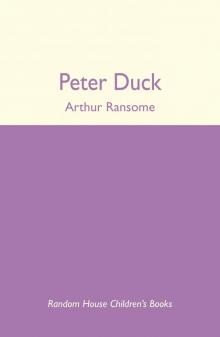 Peter Duck: A Treasure Hunt in the Caribbees
Peter Duck: A Treasure Hunt in the Caribbees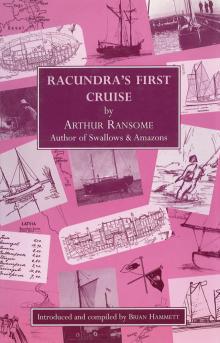 Racundra's First Cruise
Racundra's First Cruise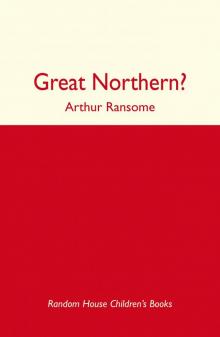 Great Northern?
Great Northern?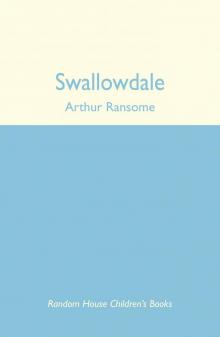 Swallowdale
Swallowdale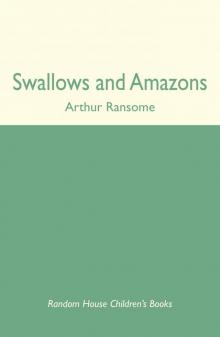 Swallows and Amazons
Swallows and Amazons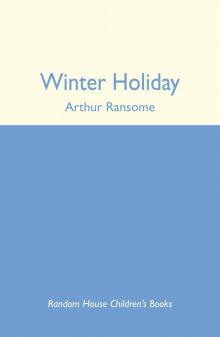 Winter Holiday
Winter Holiday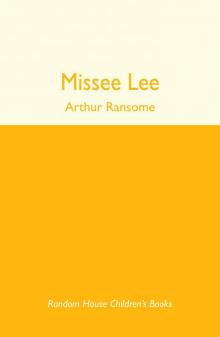 Missee Lee: The Swallows and Amazons in the China Seas
Missee Lee: The Swallows and Amazons in the China Seas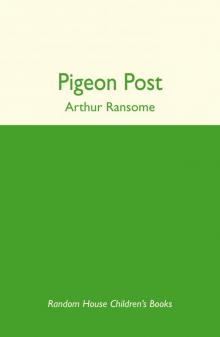 Pigeon Post
Pigeon Post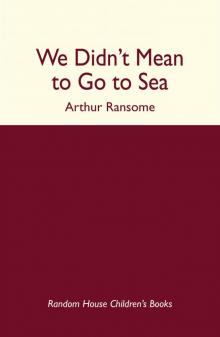 We Didn't Mean to Go to Sea
We Didn't Mean to Go to Sea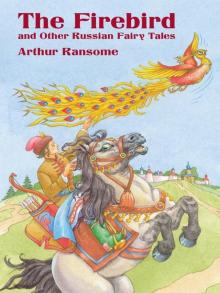 The Firebird and Other Russian Fairy Tales
The Firebird and Other Russian Fairy Tales Coot Club
Coot Club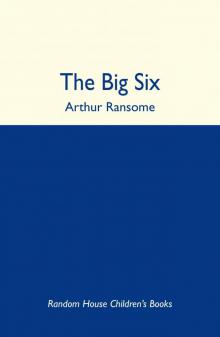 The Big Six: A Novel
The Big Six: A Novel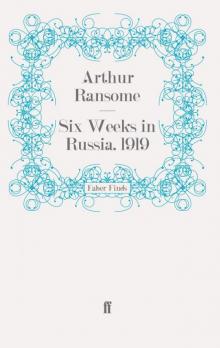 Six Weeks in Russia, 1919
Six Weeks in Russia, 1919 Secret Water
Secret Water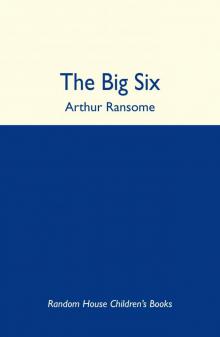 The Big Six
The Big Six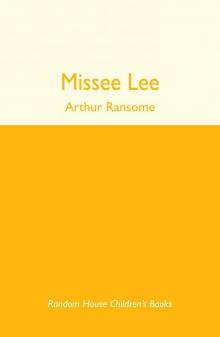 Missee Lee
Missee Lee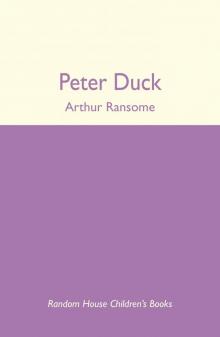 Peter Duck
Peter Duck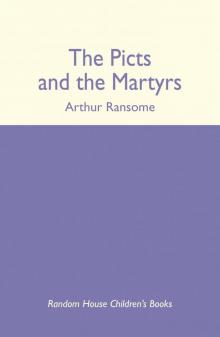 The Picts and the Martyrs
The Picts and the Martyrs